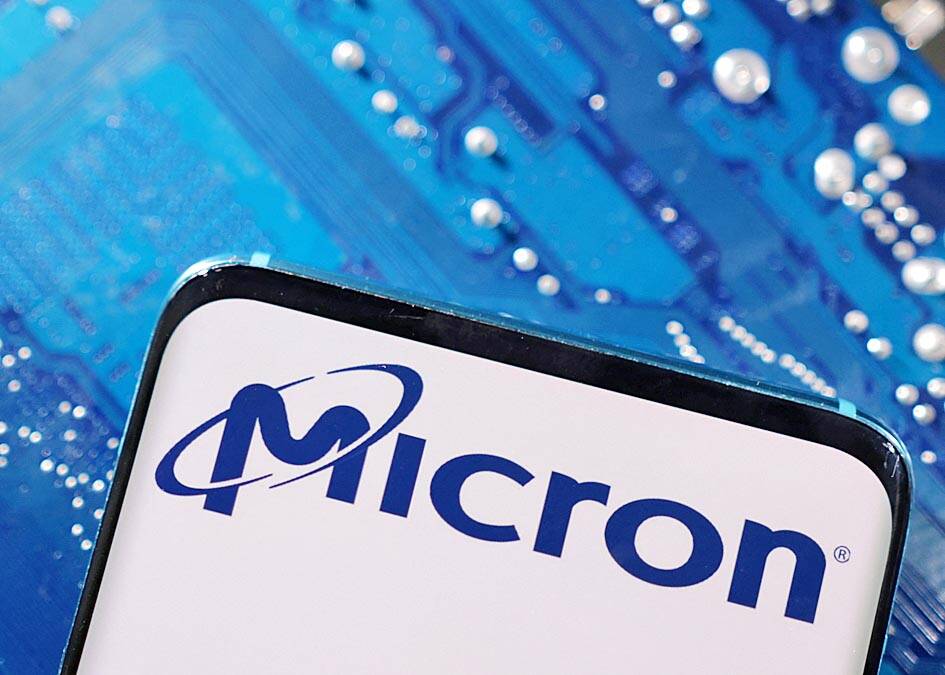US-based memorychip supplier Micron Technology Inc on Friday said that it would start producing its most advanced DRAM exclusively in Taiwan in 2025.
Micron said that it would mass produce chips using its advanced 1-gamma process node DRAM in Taiwan, ahead of any other production site worldwide.
The company installed cutting-edge extreme ultraviolet (EUV) lithography production equipment in its A3 fab in Taichung last year.

Photo: Reuters
The 1-gamma process — its third-generation 10 nanometer-class node — was jointly developed by Micron’s research and development (R&D) teams in Taiwan and Japan.
Micron on Thursday said it would invest up to US$3.6 billion in Japan.
A Ministry of Economic Affairs official said that Micron had informed the ministry of its investment plan in Japan before it was announced.
Micron’s R&D program in Taiwan remains unchanged and would continue as planned, the official said.
The statements from Micron and the ministry apparently aim to ease concerns over the company’s future in Taiwan.
Micron announced its Japanese investment plan after Japanese Prime Minister Fumio Kishida met with executives from seven semiconductor companies, including Micron and Taiwan Semiconductor Manufacturing Co (台積電). The others were Applied Materials Inc, IBM Corp, Samsung Electronics Co, Intel Corp and Belgian semiconductor research group Interuniversity Microelectronics Centre.
The plan would include additional investment over the next few years in Micron’s factory in Hiroshima Prefecture, the company said.
According to a report from Nikkei Asia, the Hiroshima plant produces advanced DRAM chips and the US chipmaker plans to install a state-of-the-art production line there, with Tokyo’s backing.
That could include EUV lithography production equipment, needed for the mass production of the 1-gamma process, which Micron said it would install in Japan, without specifying whether it would be used at the Hiroshima facility.
EUV refers to a soft X-ray technology, which has a wavelength of 13.5 nanometers.
Micron is the largest foreign employer and foreign direct investor in Taiwan, with more than 10,000 workers in its fabs in Taichung and Taoyuan.
Micron has said it would continue to recruit highly skilled personnel in the years ahead.
The Taoyuan factory is from Micron’s acquisition of Taiwanese DRAM maker Inotera Memories Inc (華亞科技) in 2016, while the Taichung factory is from the acquisition of another local DRAM maker, Rexchip Electronics Corp (瑞晶電子), in 2012.

In Italy’s storied gold-making hubs, jewelers are reworking their designs to trim gold content as they race to blunt the effect of record prices and appeal to shoppers watching their budgets. Gold prices hit a record high on Thursday, surging near US$5,600 an ounce, more than double a year ago as geopolitical concerns and jitters over trade pushed investors toward the safe-haven asset. The rally is putting undue pressure on small artisans as they face mounting demands from customers, including international brands, to produce cheaper items, from signature pieces to wedding rings, according to interviews with four independent jewelers in Italy’s main

Japanese Prime Minister Sanae Takaichi has talked up the benefits of a weaker yen in a campaign speech, adopting a tone at odds with her finance ministry, which has refused to rule out any options to counter excessive foreign exchange volatility. Takaichi later softened her stance, saying she did not have a preference for the yen’s direction. “People say the weak yen is bad right now, but for export industries, it’s a major opportunity,” Takaichi said on Saturday at a rally for Liberal Democratic Party candidate Daishiro Yamagiwa in Kanagawa Prefecture ahead of a snap election on Sunday. “Whether it’s selling food or

CONCERNS: Tech companies investing in AI businesses that purchase their products have raised questions among investors that they are artificially propping up demand Nvidia Corp chief executive officer Jensen Huang (黃仁勳) on Saturday said that the company would be participating in OpenAI’s latest funding round, describing it as potentially “the largest investment we’ve ever made.” “We will invest a great deal of money,” Huang told reporters while visiting Taipei. “I believe in OpenAI. The work that they do is incredible. They’re one of the most consequential companies of our time.” Huang did not say exactly how much Nvidia might contribute, but described the investment as “huge.” “Let Sam announce how much he’s going to raise — it’s for him to decide,” Huang said, referring to OpenAI

The global server market is expected to grow 12.8 percent annually this year, with artificial intelligence (AI) servers projected to account for 16.5 percent, driven by continued investment in AI infrastructure by major cloud service providers (CSPs), market researcher TrendForce Corp (集邦科技) said yesterday. Global AI server shipments this year are expected to increase 28 percent year-on-year to more than 2.7 million units, driven by sustained demand from CSPs and government sovereign cloud projects, TrendForce analyst Frank Kung (龔明德) told the Taipei Times. Demand for GPU-based AI servers, including Nvidia Corp’s GB and Vera Rubin rack systems, is expected to remain high,